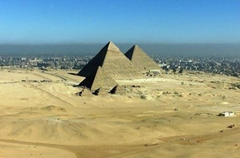 ALEXANDRIA, Egypt (AFP) – The desert is making a comeback in the Middle East, with fertile lands turning into barren wastes that could further destabilise the region, experts said at a water conference on Thursday. “Desertification spreads like cancer, it can’t be noticed immediately,” said Wadid Erian, a soil expert with the Arab League, at a conference on Thursday in the Egyptian coastal town of Alexandria. Its effect can be seen in Syria, where drought has displaced hundreds of thousands of people, ruining farmers and swelling cities, Erian said. He said Darfur in western Sudan is still reeling from a devastating war exacerbated by a shortage of water and fertile land. The United Nations Development Programme’s 2009 Arab Human Development Report said desertification threatened about 2.87 million square kilometres of land (1.15 million square miles) — or a fifth of the Middle East and north Africa. Erian said a large portion of rangeland and agricultural land was under threat, with little effort taken so far to reverse the process. Burgeoning populations, which put further strain on the environment, and climate change are accelerating the trend, he said. … Fatima el-Malah, a climate change adviser for the Arab League, said despite its impact donor countries have not dealt with desertification as a priority. Programmes by the United Nations Convention to Combat Desertification were underfunded, she said. “They said just draw a plan and we’ll fund you. There was never any funding.”
ALEXANDRIA, Egypt (AFP) – The desert is making a comeback in the Middle East, with fertile lands turning into barren wastes that could further destabilise the region, experts said at a water conference on Thursday. “Desertification spreads like cancer, it can’t be noticed immediately,” said Wadid Erian, a soil expert with the Arab League, at a conference on Thursday in the Egyptian coastal town of Alexandria. Its effect can be seen in Syria, where drought has displaced hundreds of thousands of people, ruining farmers and swelling cities, Erian said. He said Darfur in western Sudan is still reeling from a devastating war exacerbated by a shortage of water and fertile land. The United Nations Development Programme’s 2009 Arab Human Development Report said desertification threatened about 2.87 million square kilometres of land (1.15 million square miles) — or a fifth of the Middle East and north Africa. Erian said a large portion of rangeland and agricultural land was under threat, with little effort taken so far to reverse the process. Burgeoning populations, which put further strain on the environment, and climate change are accelerating the trend, he said. … Fatima el-Malah, a climate change adviser for the Arab League, said despite its impact donor countries have not dealt with desertification as a priority. Programmes by the United Nations Convention to Combat Desertification were underfunded, she said. “They said just draw a plan and we’ll fund you. There was never any funding.”
Desert spreading like ‘cancer,’ Egypt conference told
Technorati Tags:
desertification,
Africa,
Asia,
drought,
freshwater depletion,
agriculture,
population,
global warming,
climate change,
climate refugees,
soil degradation
ALEXANDRIA, Egypt (AFP) – The desert is making a comeback in the Middle East, with fertile lands turning into barren wastes that could further destabilise the region, experts said at a water conference on Thursday. “Desertification spreads like cancer, it can’t be noticed immediately,” said Wadid Erian, a soil expert with the Arab League, at a conference on Thursday in the Egyptian coastal town of Alexandria. Its effect can be seen in Syria, where drought has displaced hundreds of thousands of people, ruining farmers and swelling cities, Erian said. He said Darfur in western Sudan is still reeling from a devastating war exacerbated by a shortage of water and fertile land. The United Nations Development Programme’s 2009 Arab Human Development Report said desertification threatened about 2.87 million square kilometres of land (1.15 million square miles) — or a fifth of the Middle East and north Africa. Erian said a large portion of rangeland and agricultural land was under threat, with little effort taken so far to reverse the process. Burgeoning populations, which put further strain on the environment, and climate change are accelerating the trend, he said. … Fatima el-Malah, a climate change adviser for the Arab League, said despite its impact donor countries have not dealt with desertification as a priority. Programmes by the United Nations Convention to Combat Desertification were underfunded, she said. “They said just draw a plan and we’ll fund you. There was never any funding.”
Please print black on white. Your blog is very hard to read.
Yes, this isn't the first complaint on this topic. Recently, I increased the the font size and lightened the text, but it appears this isn't enough. I'll ponder what else I can do to the layout…